Best of #econtwitter - Week of December 4, 2022 [2/3]
Dec 06, 2022
Welcome readers old and new to this week’s edition of Best of Econtwitter. Please submit suggestions — very much including your own work! — over email or on Twitter @just_economics.
This is part two of three.
Paper summaries

Maximilian Kasy@maxkasy
🚨🥁 New working paper: 🥁🚨
Employing the unemployed of Marienthal: Evaluation of a guaranteed job program
(with @LukasLehner_)
maxkasy.github.io/home/files/pap…
Using multiple evaluation approaches, we find strong positive effects of a job guarantee for the long-term unemployed.
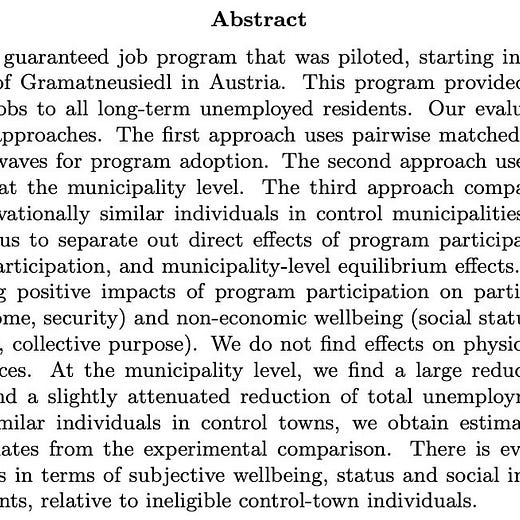
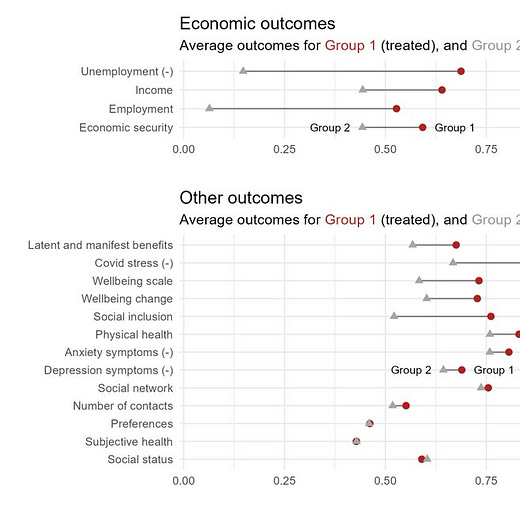
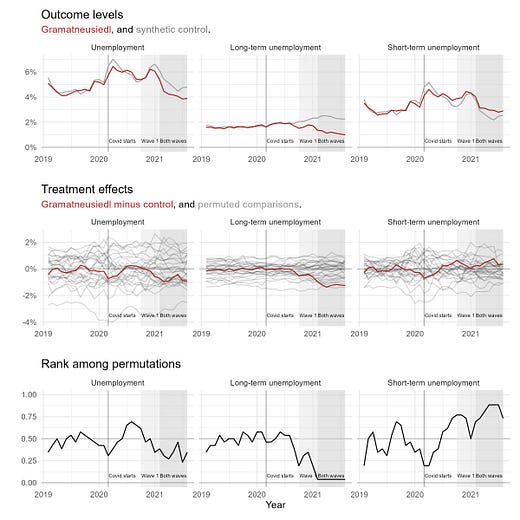
1:00 PM · Dec 3, 2022
63 Reposts · 178 Likes

Aaron Chalfin@AaronChalfin
We document the appearance of a new race gap in traffic deaths that emerged after 2014. In fact, this was the first time that the rate of traffic deaths for Black Americans exceeded that of White Americans since at least the early 1970s. Our paper tries to unravel this mystery.👇


Niskanen Center @NiskanenCenter
New @NBERpubs paper from Niskanen senior fellow @AaronChalfin and Maxim N. Massenkoff "documents the emergence of a new and concerning source of racial inequality in a major cause of death, traffic fatalities." https://t.co/8OzUBHgKR8
5:15 PM · Nov 28, 2022
151 Reposts · 617 Likes

Sarah Miller@smilleralert
New WP links CA birth certificates to tax data to see how infant and maternal health changes across the income distribution, and how these patterns differ by race/ethnicity and across countries. w/ Kate Kennedy-Moulton @PerssonPetra @maya_rossin @LaurawherryR & Gloria Aldana!

1:44 PM · Nov 28, 2022
135 Reposts · 369 Likes

Andrew Little@anthlittle
I've been working on a paper which tries to tie together a wide variety of belief biases in a common framework using ideas from information theory.
Comments/direction appreciated!
osf.io/vfqy2/

3:10 PM · Nov 28, 2022
22 Reposts · 114 Likes

Jonathan T. Rothwell@jtrothwell
There's a terrific paper out today in AER on the effects of inter-racial contact.
Students at the U of Cape Town are randomly assigned roommates, leading to multiracial room assignments. How does this exposure affect attitudes, behavior, & GPA?
pubs.aeaweb.org/doi/pdfplus/10…

3:07 PM · Nov 28, 2022
417 Reposts · 1.49K Likes

Alex Albright@AllbriteAllday
Do women face discrimination when they post questions on Stack Exchange?
If they are novice (low reputation score), yes! They get a smaller reputation bump
If they are advanced (high score), direction of discrimination ~reverses~
Paper by @aislinnbohren, @alexoimas, Rosenberg

7:08 PM · Dec 1, 2022
16 Reposts · 97 Likes

Justin Nix@jnixy
An economist did an experiment by emailing ~2000 police agencies asking for help filing a complaint. He randomized the “sender’s” name to signal race/ethnicity and sex. Overall RR 67%; agencies less likely to respond to emails signed w/Black or Hispanic names.
#AcademicTwitter
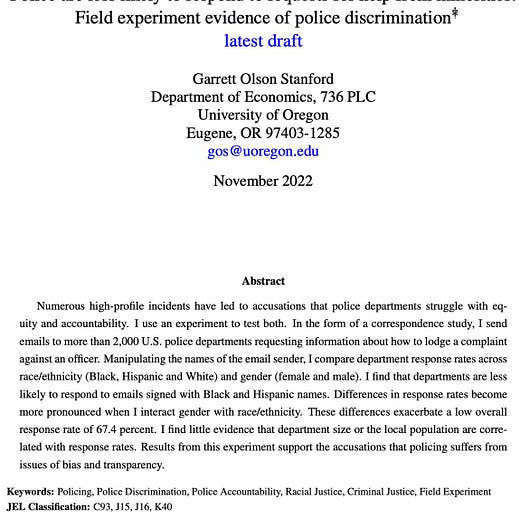

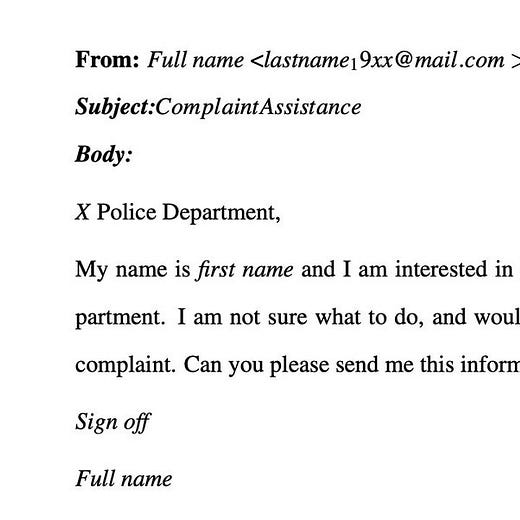
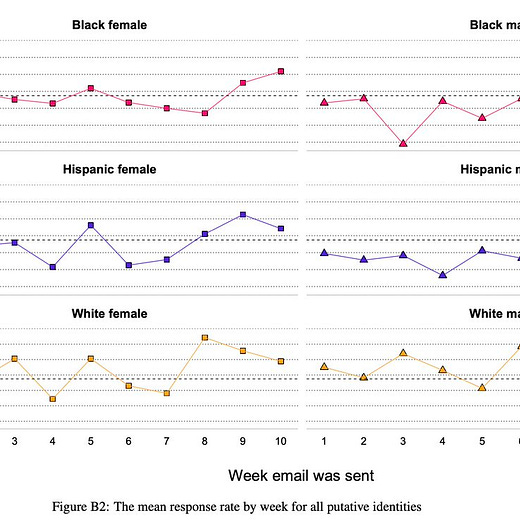
2:47 PM · Dec 3, 2022
271 Reposts · 749 Likes

Danae Hernandez Cortes@danaehernandezc
Do environmental markets cause environmental injustice? In our recent @JPubEcon paper, @kyle_c_meng and I study this for the case of California’s carbon market. 1/
Link (with open access): sciencedirect.com/science/articl…
9:40 PM · Nov 30, 2022
71 Reposts · 268 Likes
^no, they do not

Ben Ho@ho_ben
Time to do a proper 🧵of my book whytrustmatters.com. I only started twitter when it came out, now after a year of experience, using the occasion of the paperback release to try again. Also a year of book tour talks have helped refine my sales pitch!
Why Trust Matters - 1/n
whytrustmatters.com
Why Trust Matters - Ben Ho

4:29 PM · Dec 1, 2022
2 Reposts · 18 Likes

Christopher A. Neilson@ChrisANeilson
🚨new on smart matching platforms:
Teachers applying to jobs in rural ecuador were provided information on their chances of getting the jobs they applied for (given algorithm/ applications) + suggested other jobs.
Result 1: shifted entire distribution of teacher competency

2:12 AM · Dec 4, 2022
31 Reposts · 172 Likes

Ron Mau@MauMacroTweets
***NEW PAPER 🧵***
If it were a snake, it would have bitten you: Money in the New Keynesian Model
joint with @RebelEconProf
papers.ssrn.com/sol3/papers.cf…
1/12

11:20 PM · Nov 28, 2022
10 Reposts · 62 Likes

Seema Jayachandran@seema_econ
Longer (~10-tweet) summary:
We study "payments for ecosystem services" (PES) to reduce stubble burning in Punjab, India, which is a big contributor to the terrible air quality in New Delhi and the rest of north India -- particulate matter shaves 7 years off of life expectancy.

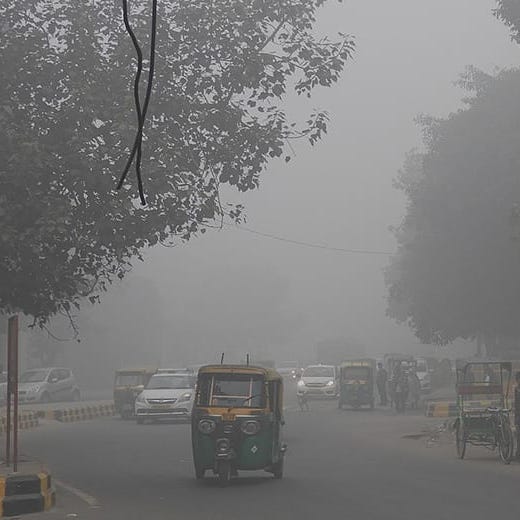
2:25 PM · Nov 28, 2022
1 Repost · 5 Likes
Public goods

Douglas Hummel-Price@DataDHP
A great analysis on school spending using our NERD$ dataset, which aggregates and harmonizes school-by-school per student spending across the 50 states and DC:
usafacts.org
How much money do states spend on education? - USAFacts

7:24 PM · Aug 29, 2022
2 Reposts · 3 Likes
^H/T the fun weekly Data is Plural newsletter

grid-database@GRIDdatabase
Thread on the Global Repository of Income Dynamics (GRID), @GRIDdatabase a new database that can be accessed here
grid-database.org
7:39 PM · Nov 30, 2022
25 Reposts · 81 Likes

